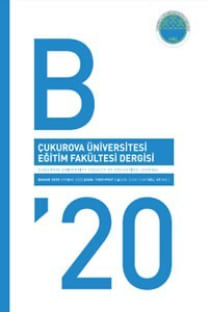Pedagojik Formasyon Öğrencilerinin Öğretmenlik Meslek Etiğine Bakış Açıları ve Çözüm Önerileri
Etik, Öğretmenlik mesleği, Üniversite öğrencileri, Mezun Öğrenciler
Pedagogic Formation Students’ Views on Ethics of Teaching Profession and Their Suggestions
Ethics, Teaching profession, University students, Graduated students.,
___
- Altınkurt, Y. & Yılmaz, K. (2011). Öğretmen Adaylarının Öğretmenlerin Mesleki Etik Dışı Davranışlar İle İlgili Görüşleri. Mehmet Akif Ersoy Üniversitesi Eğitim Fakültesi Dergisi, 11 (22), 113-128.
- Aydın, İ. (2015). Eğitim ve Öğretimde Etik, (7.baskı). Ankara: Pegem Akademi.
- Aydoğan, İ. (2011). Öğretmenlerin Mesleki Etik İlkelere Uyma Düzeylerinin Öğrenciler Tarafından Algılanması. Fırat Üniversitesi Sosyal Bilimler Dergisi, 21 (2), 87-96.
- Beyhan, Ö.& Tunç, H.S. (2012). Öğretmen adayı öğrencilerin bilişim teknolojilerini etik kullanımlarının incelenmesi. Yükseköğretim Dergisi, 2(2), 85-94.
- Coşkun, N. (2016). Eğitim fakültesi öğrencilerinin ve öğretim elemanlarının öğretmenlik meslek etiği değerlerine ilişkin görüşleri: Mesleki etik değerlerin kazanımı sürecinde örtük program. Yayımlanmamış Doktora Tezi. Adnan Menderes Üniversitesi, Sosyal Bilimler Enstitüsü, Aydın.
- Cevizci, A. (2002).Etiğe giriş. İstanbul: Engin Yayıncılık.
- Erdem, A. R. & Şimşek, S. (2013). Öğretmenlik Meslek Etiğinin İrdelenmesi. Adıyaman Üniversitesi Sosyal Bilimler Enstitüsü Dergisi, 6 (15), 185-203.
- Frankena, W. (2007).Etik. (Çev: A. Aydın). Ankara: İmge Yayınları.
- Gözen, G. (2014). Öğretmenlerin ve Okul Yöneticilerinin Eğitimsel Test Etme Sürecindeki Rolleri ve Etik Sorumlulukları. İlköğretim Online, 13 (2), 710‐725.
- Kale, N. (2009). Felsefiyat. Ankara: Pegem Akademi.
- Karataş, A. (2013). İlköğretim Öğretmen Adayları İçin Meslek Etiğinin Önemi. Marmara Coğrafya Dergisi, 28, 304-318.
- Kayıkçı, K. & Uygur, Ö. (2012). İlköğretim Okullarının Denetiminde Mesleki Etik (Bir Durum Çalışması). Kuram ve Uygulamada Eğitim Yönetimi, 18 (1), s. 65-94.
- Mayring, P. (2000). Qualitative content analysis. Forum: Qualitative Social Research, 1(2). Retrieved January 28, 2017, from http://217.160.35.246/fqs-texte/2-00/200mayring-e.pdf
- MEB (2007). TEDP Temel Eğitime Destek Projesi. Öğretmenlik Mesleği Genel Yeterlikleri : [Online] http://otmg.meb.gov.tr/belgeler/otmg/Yeterlikler.pdf 15 Mart 2017 tarihinde indirilmiştir.
- Merriam, S. B.,& Tisdell, E. J. (2015). Qualitative research: A guide to design and implementation. (4rd edition). San Francisco, CA: Jossey-Bass.
- Örenel, S. (2005). Öğretmenlerin Mesleki Etik İlkeleri Kapsamındaki Davranışlarının İlköğretim ve Orta Öğretim Öğrencilerinin Algılarıyla Değerlendirilmesi. Yayınlanmamış Yüksek Lisans Tezi. Marmara Üniversitesi, Eğitim Bilimleri Enstitüsü, İstanbul.
- Özmen, F. & Güngör, A. (2008). Eğitim denetiminde etik. İnönü Üniversitesi Eğitim Fakültesi Dergisi, (15), 137-155.
- Pehlivan-Aydın, İ. (2001). Yönetsel, mesleki ve örgütsel etik. Ankara: Pegem A Yayıncılık
- Pelit, E. & Güçer, E. (2006). Öğretmen adaylarının öğretmenlik mesleğiyle ilgili etik olmayan davranışlara ve öğretmenleri etik dışı davranışa yönelten faktörlere ilişkin algılamaları. Ticaret ve Turizm Eğitim Fakültesi Dergisi,2, 95-119.
- Şimşek, H. & Yıldırım, A. (2008). Sosyal bilimlerde nitel araştırma yöntemleri. Ankara: Seçkin Yayıncılık.
- Toprakçı, E., Bozpolat, E. & Buldur, S. (2010). Öğretmen davranışlarının kamu meslek etiği ilkelerine uygunluğu. E-Uluslararası Eğitim Araştırmaları Dergisi, 1(2),35-50.
- Uğurlu, C.T. (2008). Lise son sınıf öğrencilerinin öğretmenlerinin etik davranışlarına ilişkin algıları. Kastamonu Eğitim Dergisi, 16 (2), 367-378.
- Yaman, E. Mermer-Çetinkaya, E. & Mutlugil, S. (2009). İlköğretim Okulu Öğrencilerinin Etik Davranışlara İlişkin Görüşleri: Nitel Bir Araştırma. Değerler Eğitimi Dergisi, 7 (17), 93-108.
- Yeşilyurt, E.,& Kılıç, M.E. (2014). Assessing of Teachers’ Level of Ethical Values According to Secondary School Students’Perception. EKEV Akademi Dergisi, 18 (60), 471-486.
- Yılmaz, K.& Altınkurt, Y. (2009). Öğretmen adaylarının mesleki etik dışı davranışlar ile ilgili görüşleri. İş Ahlakı Dergisi, 2 (4), 71-88.
- YÖK (2007). Öğretmen yetiştirme ve eğitim fakülteleri (1982–2007).Ankara: YÖK Yayını.
- ISSN: 1302-9967
- Yayın Aralığı: Yılda 3 Sayı
- Başlangıç: 2000
- Yayıncı: Çukurova Üniversitesi Matbaası
Yapım Eki Öğretiminin Türkçeyi Yabancı Dil Olarak Öğrenenlerin Kelime Hazinesi Üzerindeki Etkisi
Türkçede Çiftgeçişli Eylemlerin Edinimi
Diser ERTEKİN SUCAK, Hatice SOFU
Acquisition of Ditransitive Verbs in Turkish
Sınıf Öğretmenlerinin Sorunları: Sınıf Öğretmenlerinin Deneyimlerine Dayalı Bir Araştırma
Sevil BÜYÜKALAN FİLİZ, Ensar AYDIN
Öğretmen Adaylarının Matematik Kavramına Yönelik Tutumları ve Metafor Algıları
OKAN KUZU, YASEMİN KUZU, SADIK YÜKSEL SIVACI
Çiftler Evliliklerini Nasıl Algılıyorlar?
Ortaokul Öğrencilerinin Duygusal Zekâlarının Fen Öğrenmeye Yönelik Motivasyonlarını Yordama Düzeyi
Nilgün YENİCE, Barış ÖZDEN, Gizem ALPAK TUNÇ
Suat YAMAK, Hakan Şevki AYVACI, Mehmet Kürşad DURU
Öğretmen Adaylarının Desen Çizimine Yönelik Problemlerin İncelenmesi
